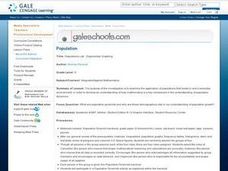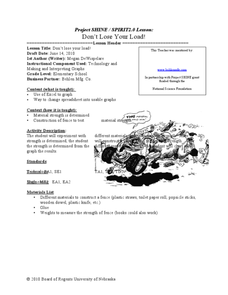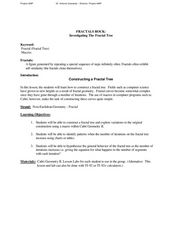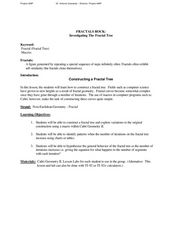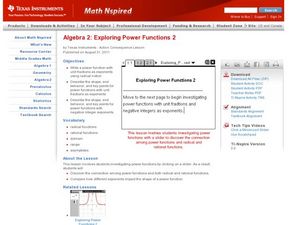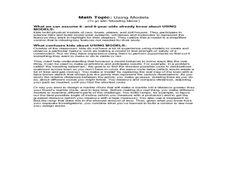Curated OER
Populations Lab - Exponential Graphing
Ninth graders investigate the application of populations that exists in one's everyday environment, in order to develop an understanding of how mathematics is a key component in the understanding of population dynamics.
Curated OER
Don't Lose Your Load!
Students create graphs using collected data. In this algebra lesson, students use spreadsheet in Excel to create graphs to interpret their data and make predictions. They rewrite word problems using algebraic expressions.
Curated OER
Writing a Number Sentence
Third graders analyze word problems. In this number sentence lesson, 3rd graders evaluate word problems. Students create number sentences from word problems.
Curated OER
Numeral Analysis: Rate of Convergence
In this rate of convergence worksheet, students use three different methods to compute an order of convergence of a function. This four-page worksheet contains approximately 10 problems, with examples.
Curated OER
Population Models and Qualitative Analysis, Part 2
In this population model instructional activity, students explore models of population growth using the Gompertz growth model and the exponential growth model. They sketch a graph of the slope function and determine possible solutions...
Curated OER
Polynomial Functions
Students explore polynomial functions. For this Algebra II lesson, students explore graphs of polynomial functions as classify the functions as linear, quadratic, cubic, or quartic. Students determine the regression equation...
Curated OER
Relating Division and Subtraction
Third graders relate the process of division to subtracting equal groups. Through guided practice and teacher demonstration, they complete division problems using a subtraction method. Students complete problems independently for...
Curated OER
Dividing By 3 and 4
Third graders are introduced to how to divide by 3 and 4. They are told that are going to use the same procedures as they did on yesterday, except with new divisors. Students turn their attention to the Paddle Problem on page 206 of...
Curated OER
Properties of Logarithms
Students explore the concept of logarithms. In this logarithms lesson, students graph logarithms on their Ti-Nspire calculator. Students describe the shapes of their graphs by identifying slope, y-intercepts, and roots. ...
Curated OER
Implicit Differentiation
In this implicit differentiation worksheet, students use the microscope approximation method and Euler's method to approximate values at a given point. This two-page worksheet contains five problems.
Curated OER
Fractals Rock
Students identify the repeated sequences of a pattern. In this geometry lesson plan, students identify fractals in patterns and nature. They construct a fractal tree and make conjectures.
Curated OER
Fractals Rock: Investing the Fractal Tree
Young scholars investigate the relationship between fractals and sequences. In this geometry lesson, students build a fractal tree. They investigate different career fields where fractals are used in the real world.
Curated OER
Koch Snowflake
Students investigate Koch's Snowflake. In this geometry instructional activity, students identify the properties of creating Koch's snowflake. They solve problems dealing with fractals and patterns.
Curated OER
Fractals: Koch Snowflake
Students investigate the properties of Koch's snowflake. In this geometry lesson, students investigate fractals and patterns. They create Koch's snowflake using Cabri software.
Curated OER
Maximum, Minimum, Increasing, Decreasing
Learners practice with the StudyCard set on assessing real-world contexts dealing with the concepts of maximum, minimum, increasing and decreasing. They view a variety of quadratic functions and equations with their TI-83 Plus calculators.
Curated OER
Exploring Power Functions 2
Young mathematicians learn to write algebraic equations. They solve and graph different polynomial functions with different powers. They then graph radicals and identify the domain and range.
Curated OER
Graph Logarithms
Mathematicians graph logarithmic equations. Teach your students how to identify the intercepts of logarithmic equations and tell whether the function is increasing or decreasing. They find the domain and range of each function.
Curated OER
Earth Day - Hooray
Students listen to the story, Earth Day - Hooray!, and discuss the story as it is being read. In this Earth Day lesson, students discuss incentives and penalties in regards to taking care of the Earth. This lesson plan also...
Curated OER
Swing in Time
Learners examine the motion of pendulums and come to understand that the longer the string of the pendulum, the fewer the number of swings in a given time interval. They see that changing the weight on the pendulum does not have an...
Curated OER
This is for the Birds!
Students complete activities to investigate wild birds. In this bird study lesson, students make a wild bird feeder to examine the proper ways to care for wild birds. Students explore organizations in their community that help wild birds...
Curated OER
Modeling Mania
Learners describe techniques helpful in solving spatial problems which utilize the notion that a model is a simplified version of something complicated. They utilize methods such as sketching or drawing possible solutions to a problem.
Curated OER
Definite Integral
Learners investigate the intervals represented by a function in this calculus lesson. They decide what interval of the function will be positive, negative or zero. They are then given graphs of functions and asked to analyze it.
Curated OER
Exponential Functions and the Natural Logarithm
Students solve exponential and log functions. In this algebra lesson plan, students graph natural log and logarithmic functions. They compare and contrast between logs and the exponential graphs.
Curated OER
Multiplicity of Zeros of Functions
Pupils identify the multiplicity of exponents as they graph polynomials. They write equations for a function given the zeros of the function and work backwards from solving equations.
